Inhibiting a Key Signaling Pathway in Immune Cells Slows Alzheimer's Progression
Weill Cornell Medicine researchers recently discovered that inhibiting a key signaling pathway in brain cells can lessen brain inflammation and slow the development of Alzheimer’s Disease and other neurodegenerative conditions. The study was recently published in Nature, and the findings provide valuable insights into developing new therapeutic strategies to treating Alzheimer’s and other brain diseases.
Many neurodegenerative diseases, including Alzheimer’s Disease, are characterized by brain inflammation that happens when immune cells in the brain are activated. Inflammation causes the spread of abnormal protein growths called tau formations. Tau formations are strands of protein found in neurons, and they stimulate the inflammatory activation of microglia using a multifunctional NF-κB pathway found within the immune cells. When tau tangles are injected into animal brain cells, they create more tau tangles throughout the brain. Rapid increases in the amount of tau tangles indicates the progression of a neurodegenerative disease in which tau has a toxic effect on memory and cognition.
The researchers noted that inhibiting the NF-κB pathway signaling reversed the inflammatory state of the immune cells and reduced the number of tau tangles. When the NF-kB pathway is inactivated, the microglia is restored to a more normal cell appearance and functioning. Senior author Dr. Li Gan explains the importance of this research for certain brain disorders: “Our findings suggest restraining overactive NF-κB may be a good therapeutic strategy in Alzheimer’s and other tau-mediated neurodegenerative diseases.” Inactivating the NF-kB pathway reduces the spread of tau tangles and prevents cognitive deficit.
The study indicated that drug treatments that calm overactive microglial NF-κB signaling cells may be more effective than conventional approaches which target amyloid plaques and tau tangles. Gan and her team’s next research steps include closer analysis of how microglial NF-κB signaling impairs neurons and leads to cognitive and memory deficits.
Sources:
Eureka News Alert, Nature Communications, Weill Cornell Medicine News








